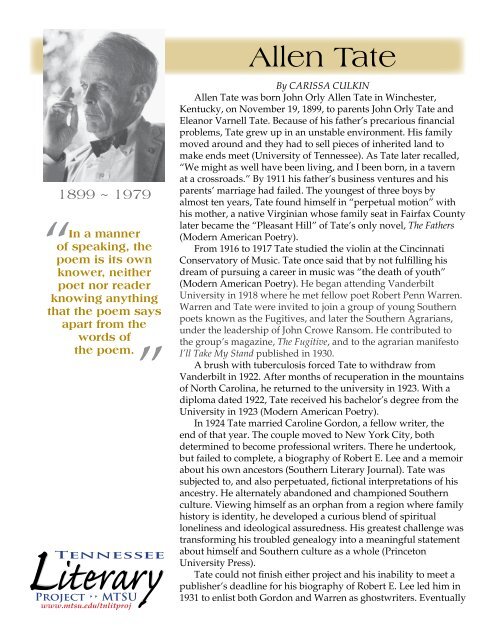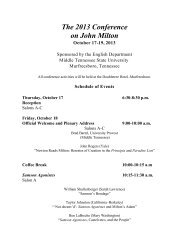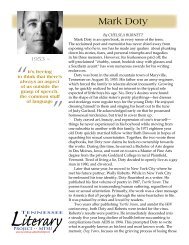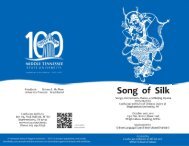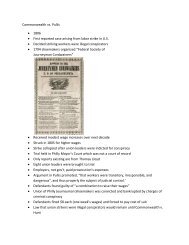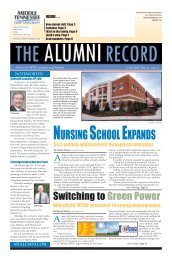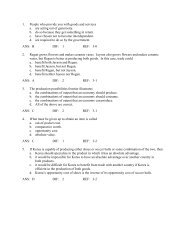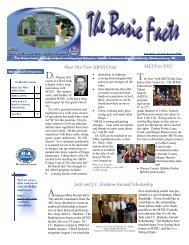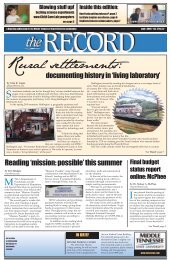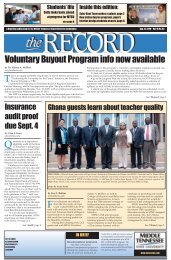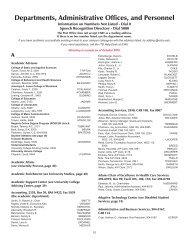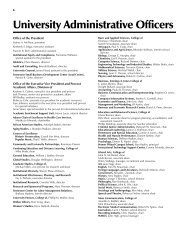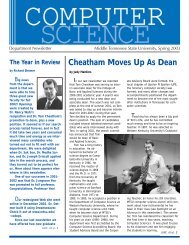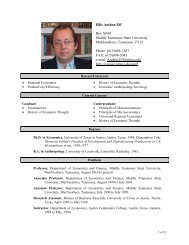Allen Tate - Middle Tennessee State University
Allen Tate - Middle Tennessee State University
Allen Tate - Middle Tennessee State University
Create successful ePaper yourself
Turn your PDF publications into a flip-book with our unique Google optimized e-Paper software.
1899 ~ 1979<br />
“<br />
In a manner<br />
of speaking, the<br />
poem is its own<br />
knower, neither<br />
poet nor reader<br />
knowing anything<br />
that the poem says<br />
apart from the<br />
words of<br />
the poem.<br />
Literary<br />
<strong>Tennessee</strong><br />
Literary<br />
Project •• MTSU<br />
www.mtsu.edu/tnlitproj<br />
“<br />
<strong>Allen</strong> <strong>Tate</strong><br />
By CARISSA CULKIN<br />
<strong>Allen</strong> <strong>Tate</strong> was born John Orly <strong>Allen</strong> <strong>Tate</strong> in Winchester,<br />
Kentucky, on November 19, 1899, to parents John Orly <strong>Tate</strong> and<br />
Eleanor Varnell <strong>Tate</strong>. Because of his father’s precarious financial<br />
problems, <strong>Tate</strong> grew up in an unstable environment. His family<br />
moved around and they had to sell pieces of inherited land to<br />
make ends meet (<strong>University</strong> of <strong>Tennessee</strong>). As <strong>Tate</strong> later recalled,<br />
“We might as well have been living, and I been born, in a tavern<br />
at a crossroads.” By 1911 his father’s business ventures and his<br />
parents’ marriage had failed. The youngest of three boys by<br />
almost ten years, <strong>Tate</strong> found himself in “perpetual motion” with<br />
his mother, a native Virginian whose family seat in Fairfax County<br />
later became the “Pleasant Hill” of <strong>Tate</strong>’s only novel, The Fathers<br />
(Modern American Poetry).<br />
From 1916 to 1917 <strong>Tate</strong> studied the violin at the Cincinnati<br />
Conservatory of Music. <strong>Tate</strong> once said that by not fulfilling his<br />
dream of pursuing a career in music was “the death of youth”<br />
(Modern American Poetry). He began attending Vanderbilt<br />
<strong>University</strong> in 1918 where he met fellow poet Robert Penn Warren.<br />
Warren and <strong>Tate</strong> were invited to join a group of young Southern<br />
poets known as the Fugitives, and later the Southern Agrarians,<br />
under the leadership of John Crowe Ransom. He contributed to<br />
the group’s magazine, The Fugitive, and to the agrarian manifesto<br />
I’ll Take My Stand published in 1930.<br />
A brush with tuberculosis forced <strong>Tate</strong> to withdraw from<br />
Vanderbilt in 1922. After months of recuperation in the mountains<br />
of North Carolina, he returned to the university in 1923. With a<br />
diploma dated 1922, <strong>Tate</strong> received his bachelor’s degree from the<br />
<strong>University</strong> in 1923 (Modern American Poetry).<br />
In 1924 <strong>Tate</strong> married Caroline Gordon, a fellow writer, the<br />
end of that year. The couple moved to New York City, both<br />
determined to become professional writers. There he undertook,<br />
but failed to complete, a biography of Robert E. Lee and a memoir<br />
about his own ancestors (Southern Literary Journal). <strong>Tate</strong> was<br />
subjected to, and also perpetuated, fictional interpretations of his<br />
ancestry. He alternately abandoned and championed Southern<br />
culture. Viewing himself as an orphan from a region where family<br />
history is identity, he developed a curious blend of spiritual<br />
loneliness and ideological assuredness. His greatest challenge was<br />
transforming his troubled genealogy into a meaningful statement<br />
about himself and Southern culture as a whole (Princeton<br />
<strong>University</strong> Press).<br />
<strong>Tate</strong> could not finish either project and his inability to meet a<br />
publisher’s deadline for his biography of Robert E. Lee led him in<br />
1931 to enlist both Gordon and Warren as ghostwriters. Eventually
<strong>Allen</strong> <strong>Tate</strong><br />
Selected<br />
Bibliography<br />
POETRY<br />
Poems, 1928-1931<br />
(1932)<br />
The Mediterranean<br />
& Other Poems (1936)<br />
Selected Poems (1937)<br />
The Winter Sea (1944)<br />
Poems, 1920-1945<br />
(1947)<br />
Poems, 1922-1947<br />
(1948)<br />
Two Conceits for the<br />
Eye to Sing, If Possible<br />
(1950)<br />
Poems (1960 & 1961)<br />
The Swimmers & Other<br />
Selected Poems (1970)<br />
Mr. Pope & Other<br />
Poems (1970)<br />
The Swimmers &<br />
Other Selected Poems<br />
(1971)<br />
PROSE<br />
The Fathers (1938)<br />
Reason in Madness<br />
(1941)<br />
On the Limits of<br />
Poetry: Selected<br />
Essays, 1928-1948<br />
(1948)<br />
The Hovering Fly<br />
(1949)<br />
The Forlorn Demon<br />
(1953)<br />
Collected Essays<br />
(1959)<br />
Essays of Four<br />
Decades (1959)<br />
Memoirs & Opinions,<br />
1926-1974 (1975)<br />
he abandoned the project. A Guggenheim Fellowship in 1928 took<br />
<strong>Tate</strong> abroad--to London—where he met Eliot, and to Paris, where<br />
he took tea with Gertrude Stein, established a friendship with<br />
Ernest Hemingway, and cemented his relationships with Ford and<br />
Bishop (Modern American Poetry).<br />
In 1930 <strong>Tate</strong> returned to the United <strong>State</strong>s. His works<br />
published immediately after his time in Europe were mainly<br />
essays, many of which were included in the I’ll Take My Stand<br />
(1930) in which <strong>Tate</strong> defended the Southern United <strong>State</strong>s’<br />
traditionally agricultural economy.<br />
<strong>Tate</strong> became a poet in residence at Princeton, where he<br />
remained until 1942. In 1943 he became the consultant in poetry<br />
at the Library of Congress, in 1944 the editor of the Sewanee<br />
Review, and in 1946 editor of belle lettres at Henry Holt in New<br />
York. In 1948 he served on the jury that awarded, in February<br />
1949, the controversial first Bollingen Prize to Ezra Pound for<br />
his Pisan Cantos. <strong>Tate</strong> resumed his academic career in 1948 when<br />
he accepted a three-year appointment at New York <strong>University</strong><br />
(Modern American Poetry). In 1951 he accepted an academic<br />
appointment with tenure at the <strong>University</strong> of Minnesota, where<br />
he remained until his retirement in 1968. During the 1950s, often<br />
through an association with the new Fulbright program, he gave<br />
frequent lectures abroad in England, France, Italy, and India.<br />
The last twenty years of <strong>Tate</strong>’s life witnessed his divorce from<br />
Gordon in 1959, his marriage also in 1959 to the poet Isabella<br />
Gardner, and his divorce from her and marriage to Helen Heinz,<br />
his former student at Minnesota, in 1966. In 1967 he became the<br />
father of twin sons, one of whom died in an accident in 1968 after<br />
the family’s move to Sewanee, <strong>Tennessee</strong>. A third son was born<br />
in 1969 (Modern American Poetry) and ten years later <strong>Allen</strong> <strong>Tate</strong><br />
died in Nashville.<br />
<strong>Allen</strong> <strong>Tate</strong>’s grave, Sewanee Cemetery


